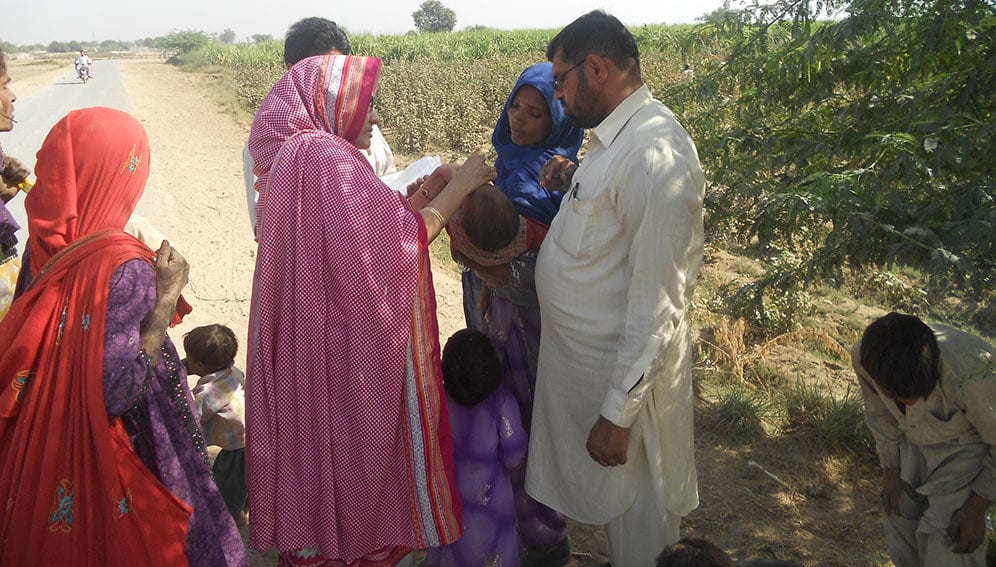19/11/19
Pakistan rolls out new typhoid vaccine to fight resistant strain

By: Saleem Shaikh
Send to a friend
The details you provide on this page will not be used to send unsolicited email, and will not be sold to a 3rd party. See privacy policy.
[ISLAMABAD] Pakistan has become the first country in the world to launch a new vaccine that provides immunity against an extremely drug-resistant (XDR) strain of typhoid that has affected 11,000 children there and surfaced in several other countries.
The XDR strain of Salmonella enterica serovar Typhi (S. Typhi), the bacterium responsible for typhoid fever, first surfaced in Sindh province in November 2016 and has since been spreading in Pakistan, sparking fears of a global epidemic of the highly contagious, life-threatening disease.
“In addition to the outbreak in Pakistan, cases of XDR typhoid have already been confirmed in Australia, Denmark, Canada, Ireland, Taiwan and the UK – all of which had a history of travel to Pakistan.”
Meghana Sharafudeen, GAVI
“In addition to the outbreak in Pakistan, cases of XDR typhoid have already been confirmed in Australia, Denmark, Canada, Ireland, Taiwan and the UK – all of which had a history of travel to Pakistan,” says Meghana Sharafudeen, spokesperson for GAVI, the international vaccine alliance which is rolling out the new typhoid conjugate vaccine (TCV).(i)
Pakistan’s special assistant to Prime Minister on health, Zafar Mirza, tells SciDev.Net that the WHO pre-qualified vaccine, procured for Pakistan with UNICEF financial support, will be administered to ten million children throughout Sindh province by the end of this month.
“TCV, a one-dose, injectable vaccine, is expected to provide long-lasting immunity in adults, children and infants, six months of age and older,” Ghazala Parveen, chief of the biological production division of the National Institute of Health, tells SciDev.Net. “WHO has recommended TCV vaccine for use in all typhoid-endemic countries because of its heightened efficacy compared to other typhoid vaccines.”
Asad Ali, deputy director at Pakistan’s Expanded Programme on Immunisation, says the vaccination drive in Sindh will be the precursor to a phased national rollout of TCV with plans to include it in the expanded immunisation programme.
Including TCV in Pakistan’s expanded immunisation programme will protect all children over nine months, says GAVI’s Sharafudeen. ‘’Approximately 30 per cent of all typhoid cases – and 17 per cent of deaths – occur in children under five years of age. Since other typhoid vaccines cannot be used in children under two, TCV allows countries to protect more of the most vulnerable,’’ she says.
According to Sharafudeen, the initial two-week campaign will help prevent new cases of typhoid and limit the bug’s ability to develop further resistance and help preserve the longevity of antibiotics by reducing usage. ‘’Vaccinating with TCV in response to the outbreak in Pakistan showed that it is one of the best tools we have to prevent the further spread of XDR typhoid.’’
“Since drug resistance can also spread between different bacterial species, combating a disease like typhoid, which is prone to developing resistance, is especially important,’’ says Sharafuddin.
Rumina Hasan, professor of pathology and microbiology at the Aga Khan University, Karachi, Pakistan and an author of a study on extremely drug resistant strain published last, year tells SciDev.Net that such typhoid strain was the result of drug-resistant strains mutating to gain additional DNA or plasmids that encode for resistance to five of six antibiotics used in typhoid cases.
The extremely drug resistant strain was discovered by genome sequencing typhoid samples from Pakistan by a research team at the Wellcome Sanger Institute working with collaborators at Public Health England and the Aga Khan University, of which Hasan was a part. “The MDR strain probably picked up the plasmid from Escherichia coli, a bacterium linked with food poisoning, through faecal contamination,’’ she says.
“The multi-drug resistant strain was found to be resistant to three first-line drugs for typhoid — ampicillin, chloramphenicol and trimethoprim-sulfamethoxazole. While multi-drug resistant typhoid can be treated with second-line medicines like ceftriaxone and fluoroquinolone, the new extremely drug resistant strain is showing resistance to these drugs as well,” Hasan says.
“Typhoid is a major water-borne disease and improving accesses to quality WASH facilities should be ensured alongside the introduction of the vaccine,” Khan say.
This piece was produced by SciDev.Net’s Asia & Pacific desk
(i) This article was corrected on November 22 after GAVI clarified that XDR typhoid had not yet been confirmed in Portugal and was still under investigation.













